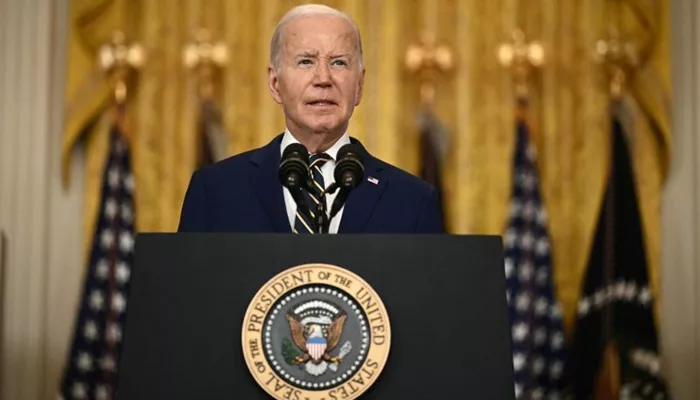Washington — The Biden administration has introduced a new program allowing spouses and stepchildren of U.S. citizens to apply for lawful permanent residence without leaving the country, helping them avoid potential reentry bans. The initiative, launched on Monday, is called the “parole in place” program.
The program, first announced on June 17, offers a path for certain undocumented individuals to gain legal residency. Unlike parole in the criminal justice system, parole under immigration law permits noncitizens to enter, reside, and sometimes work in the U.S. temporarily. It plays a key role in helping individuals meet the requirements to adjust their status under immigration law, according to the American Immigration Council.
The U.S. Immigration and Nationality Act grants the Department of Homeland Security (DHS) discretionary power to temporarily parole individuals into the U.S. for urgent humanitarian reasons or significant public benefit. This parole can also be extended to people already in the U.S. without legal status, allowing them to remain for a specified period.
Eligibility Criteria
To qualify for parole under this new program, an undocumented person must have been continuously present in the U.S. for at least 10 years. They must also have been legally married to a U.S. citizen before June 17, 2024, have no criminal convictions, and not pose a threat to national security or public safety. Additional criteria also apply.
Applicants must complete a detailed application and pay a $580 fee. There are additional costs, including a $470 fee to request work authorization and a $1,440 fee to apply for permanent residency. U.S. citizens seeking parole for their stepchildren must also file a separate form, which costs $625 per individual.
If approved, the individual will have three years to apply for permanent residency. During this period, they can remain in the U.S., stay with their family, and be eligible for work authorization.
Undocumented Spouses of U.S. Citizens
The American Immigration Council explains that spouses of U.S. citizens typically qualify for an immigrant visa as an immediate relative. However, spouses who entered the U.S. without authorization face significant challenges when trying to adjust their immigration status.
Under federal law, some immigrants, particularly those who entered the U.S. through an official port of entry or were granted parole, can apply for permanent residency without leaving the country. However, those who entered without inspection do not have this option. They must leave the U.S., attend an immigrant visa interview at a U.S. consulate abroad, and obtain a new visa to reenter the country.
Leaving the U.S. for a consulate interview often triggers a lengthy reentry ban. A 1996 immigration law imposes bans of up to 10 years on individuals who have been unlawfully present in the U.S. for more than a year, making them ineligible for visas.
Despite these challenges, current legislation allows applicants to file for a waiver, which may be granted on a case-by-case basis. To obtain a waiver, the applicant must demonstrate that their U.S. citizen spouse would suffer “extreme hardship” due to prolonged separation. However, as of April, the processing time for these waiver requests was over 41 months.
Ultimately, the decision to grant permanent residency to someone who entered the U.S. illegally, even if married to a U.S. citizen, is up to a U.S. immigration officer’s discretion.
With the parole in place program, undocumented immigrants married to U.S. citizens can remain in the U.S. for up to three years, obtain work authorization, and apply for lawful permanent resident status without having to leave the country.
DHS estimates that around 500,000 undocumented spouses of U.S. citizens, along with approximately 50,000 stepchildren, would be eligible to apply under this program.
Criticism and Legal Concerns
The program has faced criticism, particularly from a group of Republican senators who sent a letter to President Joe Biden in June. They expressed “grave concerns” about the parole in place program, arguing that it contradicts existing laws passed by Congress and could worsen the ongoing border crisis.
The senators have previously challenged the legality of the administration’s parole authority, arguing that it should be limited to “case-by-case” decisions involving individuals not already present in the U.S. They urged the administration to rescind the policy immediately.
While the program has not yet faced legal challenges in court, Biden administration officials remain confident about its legal basis. “We feel strongly that we are on strong legal footing to make this announcement and are comfortable doing so,” said a senior official during a June call with reporters, speaking on condition of anonymity.


